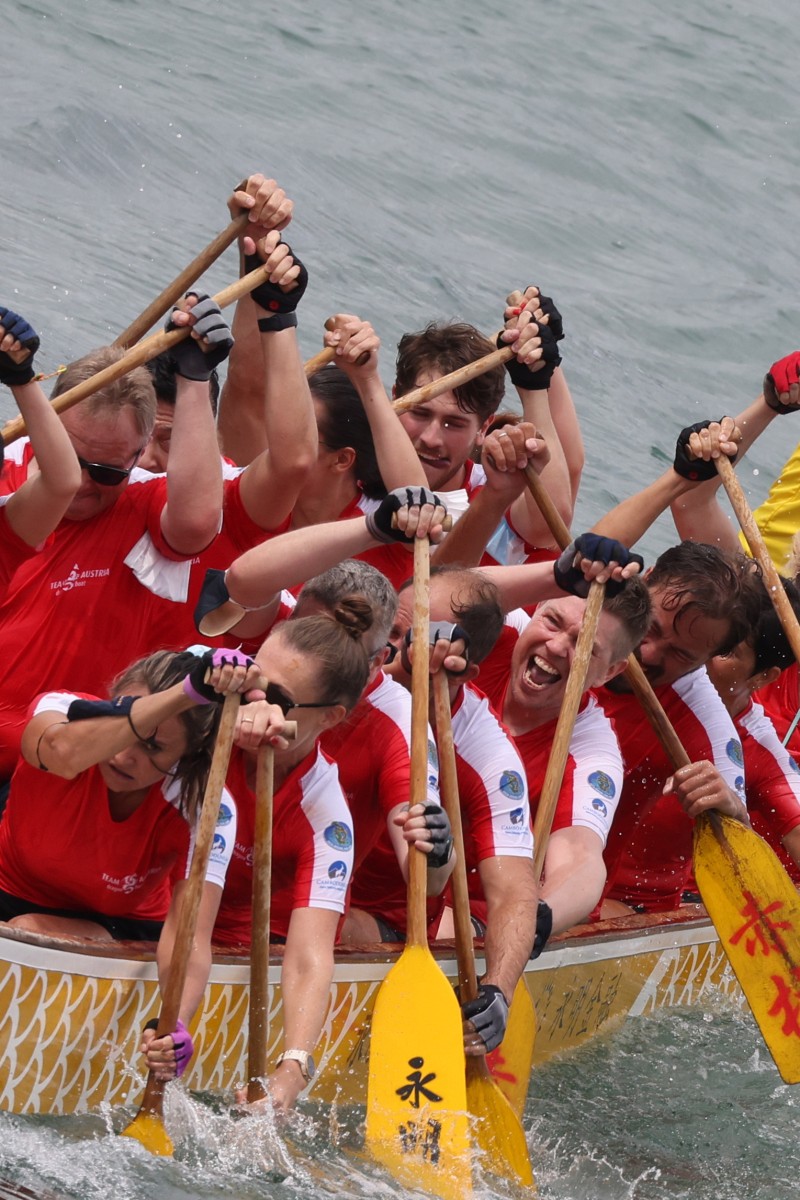
- Also known as the Tuen Ng Festival, many associate the day with rice dumplings and races, but there are more ways to celebrate
- Festival may have begun as a way to ward off bad luck and keep people safe and healthy
 A photo from the Stanley Dragon Boat Races during the Tuen Ng Festival in 2021. Photo: Nora Tam
A photo from the Stanley Dragon Boat Races during the Tuen Ng Festival in 2021. Photo: Nora TamToday is the annual Dragon Boat Festival. Also known as the Tuen Ng Festival, most people immediately associate the celebration with scrumptious rice dumplings and the thousands of paddlers and spectators who flock to the ocean to take part in the famous Hong Kong International Dragon Boat Race.
Do you know the origins of the festival? Aside from watching the races, what are you supposed to do to celebrate? Here are a few lesser-known facts about one of Hong Kong’s most beloved traditions.
The traditional family business of crafting a Tuen Ng Festival dragon boat
When is the Dragon Boat Festival celebrated?
The Dragon Boat Festival is celebrated on the fifth day of the fifth month of the Chinese calendar. This year, the festival falls on June 22.
What is the legend behind the festival?
You may know that the Dragon Boat Festival is meant to commemorate the death of the Chinese poet Qu Yuan, who died in the ancient state of Chu during the Warring States period (475–221BC), a bloody time when the different provinces of modern-day China fought endlessly against each other.
The patriotic poet was filled with despair about the state of his home and drowned himself in the Miluo River in Hunan province. According to legend, locals raced out in their boats to try and save him, and threw balls of sticky rice into the river to protect his body from being eaten by fish.
However, it is also believed that the festival actually started before Qu’s tragic death, as a way to ward off bad luck.
According to Chinese belief, the fifth lunar month is “poisonous” because poisonous creatures, like snakes and scorpions, are active during the early days of summer. They also believed that people were more prone to illness during this time, so they held different celebrations to keep evil spirits, diseases, pests, and drought away.
How dragon boat racing brought a family closer together
How does Hong Kong celebrate the festival?
Apart from the well-known practices of eating sticky rice dumplings and dragon boat racing, Hong Kong has a long-standing tradition that takes place in the fishing village of Tai O – the Dragon Boat Water Parade.
This celebration combines spiritual traditions and competitive racing and has been recognised as part of the city’s cultural heritage. Its origin dates back hundreds of years, to when the village was attacked by a plague that caused many deaths.
Local residents decided to invite the gods from four local temples into the village by carrying their statues on dragon boats and parading along the waterways, hoping to drive away from the epidemic and bless the village.
The man who put Hong Kong dragon boat racing on a global map
Nowadays, the parade is organised by three fishermen’s associations in Tai O. On the morning before the festival, the associations will row their dragon boats to visit the four temples and receive the statues of the gods. Then during the parade, residents burn joss paper as an offering to pacify the water ghosts and ask for blessings from the deities in the coming year.
The races take place after the water parade, with the three dragon boats that pull the deity sampans holding a friendly race before kicking off the formal competitions. Amid the typical fanfare of drumming, shouting, and excitement that marks all dragon boat races, the people of the village also take the chance to worship the gods and pray for peace.
What are the other interesting traditions behind the festival?
Another interesting tradition is to balance an egg upright to gain prosperity for the year. It is believed that it is easiest for you to make an egg stay ‘standing up’ during the festival as the Earth’s gravitational pull is strongest at this time, which makes it possible to balance an egg.
Although the tradition is more prevalent in Taiwan, this year one Hong Kong company will host the first-ever Egg Grand Gala on June 3 on the Kwun Tong Promenade, hoping to bring good luck and remind Hongkongers to “stand up” amid the ongoing pandemic.
Dragon boat racing isn’t as easy as it looks: here’s what it take to compete
Another lesser-known ritual of the Dragon Boat Festival is for children to wear scented pouches and five-colour string bracelets. Filled with herbs – mainly cinnabar, realgar, and zanthoxylum – the pouches are believed to bring good luck to the children and prevent disease, while the bracelets are meant to keep them healthy: in ancient China, green, red, white, black, and yellow were said to be lucky colours, as they represent the five distinct elements of Chinese philosophy.
Since many Covid-19 restrictions have been lifted, people are hopeful that all traditional celebrations can take place as planned. It would be a much-anticipated respite for Hongkongers, and hopefully the gods will be there to cheer on the dragon boats and help drive away the coronavirus.